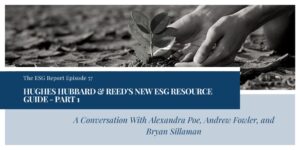
Tom Fox welcomes Alexandra Poe, Andrew Fowler, and Bryan Sillaman of Hughes Hubbard & Reed (HHR) to the ESG Report! Hughes Hubbard & Reed released their newest ESG guide with practical guidance about the most common issues in establishing an ESG program. It also gives companies resources to help them comply with the evolving ESG expectations of regulators and investors.
The ESG Resource Guide
Tom asks Alexandra to explain the genesis of the ESG Resource Guide. Andrew’s previous work with renewable energy projects paved the way, she responds. It firstly led to launching the ESG practice at HHR. Eventually, they recognized the need for a guide that helps companies “unpack and understand quickly the aim of bringing ESG into their company and creating a program”. The ESG Resource Guide is the result.
The guide begins by defining ESG terminology and available resources to ensure that companies understand the importance of having an ESG program. The next chapter helps companies “orient themselves to the breadth of this endeavor, about all the different types of folks who likely would … contribute to the genesis of your ESG program,” Alexandra says. ESG regulations from various jurisdictions and other hot topics like diversity, equity, climate change, and inclusion are also explored.
ESG Means Different Things to Different People
Bryan explains that ESG is a broad topic that means different things to different companies within different industries. You have to determine what is most relevant for your particular company, which is based on “your sector, your industry, and your geographic footprint”. This is why the team at HHR gathered data from multiple stakeholders. This process helped them to determine which ESG topics were most relevant to the various companies and organizations.
ESG and Funding
Tom asks Andrew to describe some critical issues they have identified for private equity lenders and financial institutions seeking capital investments. Andrew replies that they should ensure that they aren’t falling behind in their field while still acknowledging the new regulatory environment regulations. As a company you have to ensure that your investors feel like they’re not investing in a lost cause – that there is evidence and data to show why they should invest in your ESG program.
Resources
Alexandra Poe | LinkedIn
Andrew F. Fowler | LinkedIn
Bryan Sillaman | LinkedIn
Hughes Hubbard & Reed | How to ESG: A Resource Guide for Establishing an ESG Program for your Company


